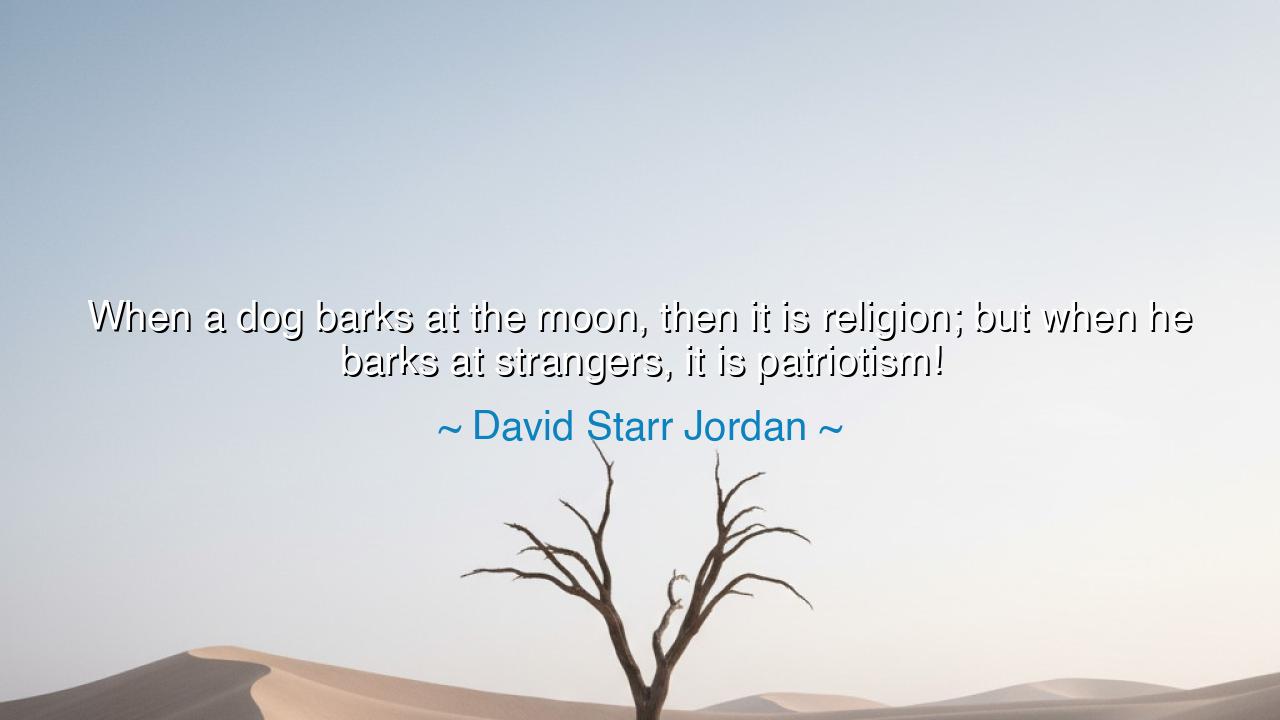
When a dog barks at the moon, then it is religion; but when he
When a dog barks at the moon, then it is religion; but when he barks at strangers, it is patriotism!






Hear the words of David Starr Jordan, spoken with wit yet heavy with truth: “When a dog barks at the moon, then it is religion; but when he barks at strangers, it is patriotism!” At first, these words may seem like mere jest, a playful image of a barking hound. Yet beneath the humor lies a profound meditation on the ways of humankind. For men and women, like dogs, often raise their voices not in reasoned thought, but in instinct and passion. And the direction of that passion—toward the heavens or toward outsiders—determines whether it is called religion or patriotism.
Consider the dog who barks at the moon: the great light of the heavens, eternal, untouchable, beyond his reach. So too do people cry out to the unseen, to gods, to mysteries, to the infinite realms that govern their fate. This is religion—the voice lifted toward the unknowable, the howl of awe, fear, reverence, and devotion. It may be irrational, for the moon does not hear, yet it is real, a reflection of the longing within the human soul for meaning beyond itself. Religion, like the barking at the moon, is not about changing the heavens, but about expressing what stirs within.
Now see the dog who barks at strangers: at those who approach his home, who step upon the land he guards. This is the spirit of patriotism, the instinct to defend, to rally, to mark one’s boundary and declare allegiance. Patriotism, in its noblest form, is loyalty to one’s people, a fierce devotion to the soil and the community that nurtured you. But in its baser form, it becomes a mere reflex—unthinking, suspicious, loud in its defense without seeking understanding. Just as the dog may bark at a friend as easily as at an enemy, so too may blind patriotism lash out at those who mean no harm.
History gives us countless examples of both barkings. Consider the Crusades, where men barked at the “moon” of holy visions, raising swords for the glory of God. Their fervor was directed toward the heavens, yet it spilled rivers of blood upon the earth. Consider also the wave of nationalism in the 20th century, where nations barked at strangers with suspicion and rage, leading to wars that scarred the globe. In both cases, the barking was loud, fervent, and often blind, more instinct than wisdom, more passion than reason.
Yet not all barking is folly. For religion, when refined by wisdom, has given birth to compassion, charity, and the lifting of the downtrodden. Patriotism, when tempered by justice, has inspired the defense of the oppressed, the resistance against tyranny, and the unyielding courage of those who fight for freedom. The dog may bark, yes, but the wise master trains the bark into vigilance rather than madness. So too must we train our faith and our patriotism: not to be blind, not to be hostile, but to be noble.
The lesson is clear: passion, whether in religion or patriotism, must be guided by reason and virtue. To bark at the moon without reflection is to waste one’s voice on shadows; to bark at strangers without discernment is to sow division where peace might be found. We must learn to pause, to ask: “Is this bark worthy? Does it defend truth and justice, or does it merely echo fear and ignorance?” In asking, we begin to rise above instinct and to act with wisdom.
So, children of the future, take this teaching to heart. Let your religion be not the blind barking at distant lights, but the reverent striving toward what is just and good. Let your patriotism be not the snarling at strangers, but the noble defense of freedom, dignity, and compassion. For the bark of a dog may be instinct, but the voice of a human soul must be guided by conscience. Train your passions, and you will not only bark—you will speak with power, heal with love, and defend with honor.






AAdministratorAdministrator
Welcome, honored guests. Please leave a comment, we will respond soon